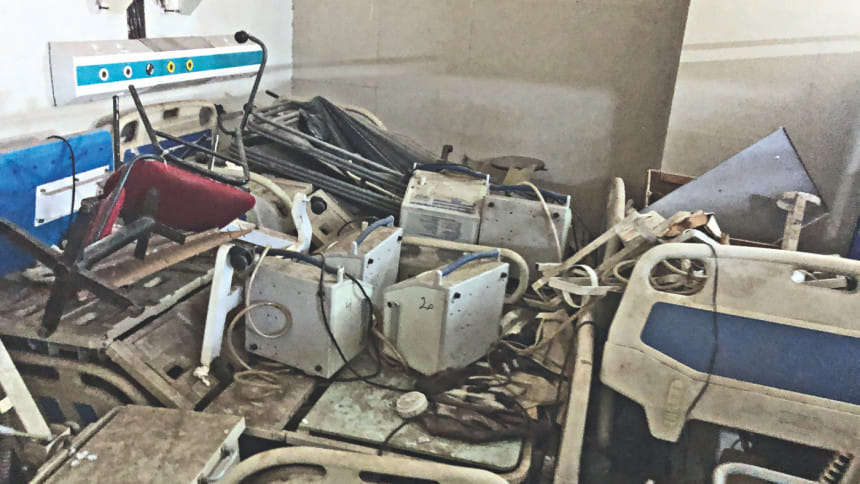ICU on sickbed

More than 12 years ago, the National Institute of Cancer Research and Hospital (NICRH) authorities had purchased eight high-end ventilators for its Intensive Care Unit.
But the Artificial Respiratory Ventilators (ARVs), the basic device required for running an ICU properly, had never been installed, depriving the critical patients of the medical services they are supposed to get at ICU.
Surprisingly though, the lifesaving devices -- each bought for Tk 70 lakh at that time -- are now left uncared for in a corner inside the ICU.

A central oxygen system was set up more than three years ago, but the ventilators were not installed. To make matters worse, the motherboards of the ventilators have been stolen in the meantime, rendering the machines dysfunctional.
This is one of several cases of irregularities The Daily Star has found during an investigation at the country’s lone specialised public hospital for cancer treatment.
The NICRH, situated in Mohakhali, is the go-to place for patients in the low-income bracket. According to an International Agency for Research on Cancer report released last year, about 1.08 lakh people die of cancer while 1.5 lakh people develop the disease every year in Bangladesh.
A SAGA OF NEGLIGENCE
On several occasions in the past, the ICU in-charge wrote to the NICRH director, requesting him to take initiatives for installing the machines. But those calls were never heard.
“Eight Artificial Respiratory Ventilators have long been remaining inoperative. Critical patients from different departments of the hospital are sent to the ICU. After complex operations, many patients needing ventilator support are also shifted there, but that service could not be provided,” said the latest letter sent on September 26.
The ICU department also informed the matter to the authorities in writing and verbally, said the letter.
The Daily Star has obtained copies of the letters.
In the meantime, the 8-bed ICU has now become a 4-bed one.
“It cannot be called an ICU at all because it lacks the basic device,” said a doctor of ICU department, wishing not to be named.
“We are deceiving our patients in the name of ICU services and they are not getting the treatment they should,” he said.
Another doctor, preferring anonymity, said, “The most surprising thing is the director knows everything but does not take any step to make the ICU functional. It’s nothing but negligence. We did not see him taking any action after the motherboards of the ventilators got stolen.”
NICRH Director Prof Dr Md Moarraf Hossen, who went on leave preparatory to retirement (LPR) on Saturday, said the machines were purchased long before he took charge.
“When I took over, I found the machines non-functional as those were kept idle for a long time,” he told this paper on December 19.
According to international standards, he said, a medical equipment usually becomes non-functional after every 10 years.
When asked how the ICU functions without the ventilators, the director said, “Cancer hospital is different from other hospitals. Putting critical cancer patients on ventilations does not improve the condition of the patients much, rather it adds to the cost. Therefore, ventilator is not much essential.”
EQUIPMENT LYING INOPERATIVE
Apart from the AVR, other equipment are also lying idle at the hospital.
Take arterial blood gas analyzer machine for an example.
The authorities bought two gas analyser machines in 2005. One of the machines was installed at an operation theatre, only to be shifted to the ICU. But the function of the machine has remained suspended for the last three years due to a lack of reagent, documents show.
The ICU department wrote to the director for supplying the reagent in 2017. But the department has not got the reagent yet, and therefore the analyser machine remained non-functional.
The other machine was never installed.
These two machines are now kept at a store room inside the ICU. The machines should be kept in a room temperature of 8-10 degrees Celsius, but there is no air-conditioning in the store room, hospital sources said.
Asked, Prof Moarraf said, “I came to know about the status of those machines recently. I am taking initiatives to make those functional.”
In the Blood Bank Department, an aphaeresis (cell separator) machine has not been used for last three years. This machine is used for preparing platelet (cell needed to stop bleeding) concentrate.
During a recent visit, this correspondent found it kept under a white curtain.
Interestingly, the motherboard of this machine too was stolen and replaced by a faulty one, said sources.
There are at least four bronchoscope machines, essential tool for diagnosing lung cancer, piled up in the store room. Those haven’t been in use for around three years.
About the bronchoscope machines, the NICRH director said, “We have equipment but not the manpower or designated post to operate those machines. We are trying to solve it.”
Asked whether keeping the equipment idle was a waste of public money, he said, “I’m not involved in any sort of corruption or irregularities. And I also cannot take the responsibility of my 1,100 staff. If I come to know about corruption of my colleagues, I will certainly take action.”
When his attention was drawn to the issue, Transparency International Bangladesh Executive Director Iftekharuzzaman said, ”This is a blatant example of irresponsible waste of public money; a complete disregard for public welfare in an extremely important field involving life and death of the hospital’s service recipients; and a total absence of internal control and accountability.
“The hospital authorities, especially the relevant senior officials, have not only failed to discharge their core functions and responsibilities, but also set an embarrassing example of recklessness in a sector that has always been starved of resources and capacities for modernisation,” he said.
The TIB executive director said, “Everyone involved in this unbelievably reckless negligence of duty must be exposed and held to account. I also suspect that this may not be an isolated instance. Therefore, the government must initiate a robust investigation and take deterrent actions without any delay.”

 For all latest news, follow The Daily Star's Google News channel.
For all latest news, follow The Daily Star's Google News channel. 





Comments